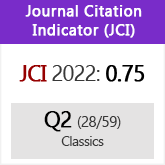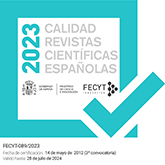Isonomia, demokratia y enfoque enactivo en Heródoto
DOI:
https://doi.org/10.3989/emerita.2020.03.1943Palabras clave:
isonomia, demokratia, enfoque enactivo, metáfora, HeródotoResumen
Siguiendo el enfoque enactivo aplicado por Popova (2015) a la narrativa, esta investigación se centra en dos grupos de metáforas en torno a las cuales Heródoto organizó sus percepciones sobre isonomia y demokratia: el cognitivo y el pragmático. En lugar de destacar las diferencias entre isonomia y demokratia, deseamos evidenciar interacciones acumulativas entre ambos conceptos, un proceso que nos permite dar sentido a una — demokratia — a través de la otra — isonomia. Este enfoque también es útil para transponer meditaciones de la Antigüedad sobre la democracia a contextos contemporáneos, no porque las democracias antiguas y contemporáneas sean similares, sino porque esas meditaciones son partes constitutivas de las metáforas de la democracia con las que vivimos actualmente, y cuyas raíces se pueden ver en los atributos que Heródoto le asigna en III 80-82 y V 66-73.
Descargas
Citas
Asheri, D., Lloyd, A. and Corcella, A. 2007: A Commentary on Herodotus Books I-IV. Edited by O. Murray and A. Moreno, Oxford.
Baragwanath, E. and De Bakker, M. (eds.), 2012: Myth, Truth and Narrative in Herodotus, Oxford. https://doi.org/10.1093/acprof:oso/9780199693979.001.0001 PMid:21819531
Bearzot, C. 2013: Come si abbatte una democrazia. Tecniche di colpo di Stato nell'Atene antica, Rome-Bari.
Bergmann, E. 2018: Conspiracy & Populism. The Politics of Misinformation, Cham. https://doi.org/10.1007/978-3-319-90359-0
Branscome, D. 2013: Textual Rivals: Self-presentation in Herodotus' Histories, Ann Arbor. https://doi.org/10.3998/mpub.1735403
Cartledge, P. 1996: «Comparatively Equal», in Ober, J. and Hedrick, C. (eds.), Demokratia. A Conversation on Democracies, Ancient and Modern, Princeton, pp. 175-186.
Cartledge, P. 2007: «Democracy, Origins of: Contribution to a Debate», in Raaflaub, K. A.; Ober, J. and Wallace, W. (eds.), Origins of Democracy in Ancient Greece, Berkeley-Los Angeles-London, pp. 155-169. https://doi.org/10.1525/california/9780520245624.003.0006
Cartledge, P. and E. Greenwood. 2002: «Herodotus as a Critic: Truth, Fiction, Polarity», in Bakker, E. J.; De Jong, I. J. F. and Van Wees, H. (eds.), Brill's Companion to Herodotus, Leiden-Boston-Cologne, pp. 351-371. https://doi.org/10.1163/9789004217584_016
Cassese, S. 2017: La democrazia e i suoi limiti, Milan.
Cuffari, E. C. 2014: «On Being Mindful About Misunderstandings in Languaging: Making Sense of Non-Sense as the Way to Sharing Linguistic Meaning», in Capuccio, M. and Froese, T. (eds.), Enactive Cognition at the Edge of Sense-Making. Making Sense of Non-Sense, Basingstoke-New York, pp. 207-237. https://doi.org/10.1057/9781137363367_9
Darbo-Peschanski, C. 1987: Le discours du particulier: Essai sur l'enquête hérodotéenne. Paris.
De Ste. Croix, G. E. M. 2004: Athenian Democratic Origins and Other Essays. Edited by D. Harvey and R. Parker with the Assistance of P. Thonemann, Oxford. https://doi.org/10.1093/acprof:oso/9780199255177.001.0001
De Vido, S. 2014: «Il dibattito sulle costituzioni nelle Storie di Erodoto», in De Vido, S. (ed.), Poteri e legittimità nel mondo antico. Da Nanterre a Venezia in memoria di Pierre Carlier, Venice, pp. 63-76.
Dewald, C. 2002: «'I Didn't Give my Own Genealogy': Herodotus and the Authorial Persona», in Bakker, E. J.; De Jong, I. J. F. and Van Wees, H. (eds.), Brill's Companion to Herodotus, Leiden - Boston - Cologne, pp. 267-289. https://doi.org/10.1163/9789004217584_013
Dewald, C. 2007: «The Construction of Meaning in the First Three Historians», in Marincola, J. (ed.), A Companion to Greek and Roman Historiography, Malden-Oxford, pp. 89-101.
Dewald, C. 2012: «Myth and Legend in Herodotus' First Book», in Baragwanath, E. and De Bakker, M. (eds.), Myth, Truth and Narrative in Herodotus, Oxford, pp. 59-86. https://doi.org/10.1093/acprof:oso/9780199693979.003.0002
Di Paolo, E. 2014: «Foreword», in Capuccio, M. and Froese, T. (eds.), Enactive Cognition at the Edge of Sense-Making. Making Sense of Non-Sense, Basingstoke-New York, pp. XI-XV.
Di Paolo, E. and Thompson, E. 2014: «The Enactive Approach», in Shapiro, E. (ed.), The Routledge Handbook of Embodied Cognition, London-New York, pp. 68-78.
Evans, J. A. S. 1981: «Notes on the Debate of the Persian Grandees in Herodotus 3, 80-82» Quaderni urbinati di cultura classica 7, pp. 79-84. https://doi.org/10.2307/20538665
Flory, S. 1987: The Archaic Smile of Herodotus, Detroit.
Forsdyke, S. 2001: «Athenian Democratic Ideology and Herodotus' Histories», AJPh 122.3, pp. 329-358. https://doi.org/10.1353/ajp.2001.0038
Fowler, R. L. 2001: «Early historiē and Literacy», in Luraghi, N. (ed.), The Historian's Craft in the Age of Herodotus, Oxford, pp. 95-115.
Gibbs Jr, R. W. 2014: «Embodied Metaphor», in Littlemore, J. and Taylor, J. R. (eds.), The Bloomsbury Companion to Cognitive Linguistics, London-New Delhi -New York-Sydney, pp. 67-184.
Grady, J. E. 2007: «Metaphor», in Geeraerts, D. and Cuyckens, H. (eds.), The Oxford Handbook of Cognitive Linguistics, Oxford, pp. 188-213.
Gray, V. 2004: «Le Socrate de Xénophon et la démocratie», Les études philosophiques 69, pp. 141-176. https://doi.org/10.3917/leph.042.0141
Hendricks, V. F. and Vestergaard, M. 2019: Reality Lost. Markets of Attention, Misinformation and Manipulation, Cham. https://doi.org/10.1007/978-3-030-00813-0
Herodoti. 1927: Historiae. Edited by C. Hude, Oxford.
Herodotus. 1998: The Histories. A New Translation by R. Waterfield, Oxford.
Johnson, J. H. and Gluck, M. 2016: Everydata. The Misinformation Hidden in the Little Data You Consume Every Day, Brookline. https://doi.org/10.4324/9781315230368
Lateiner, D. 1989: The Historical Method of Herodotus, Toronto. https://doi.org/10.3138/9781442675773
Levitsky, S. and Ziblatt, D. 2018: How Democracies Die, New York.
Liddel, P. 2009: «Democracy Ancient and Modern», in Balot, R. K. (ed.), A Companion to Greek and Roman Political Thought, Malden-Oxford, pp. 133-148. https://doi.org/10.1002/9781444310344.ch9
Linderborg, O. 2019: «The Place of Herodotus' Constitutional Debate in the History of Political Ideas and the Emergence of Classical Social Theory», Akropolis 3, pp. 5-28. https://doi.org/10.35296/jhs.v3i0.43
Marincola, J. 2007: «Herodotus and the Poetry of the Past», in Dewald, C. and Marincola, J. (eds.), The Cambridge Companion to Herodotus, Cambridge, pp. 13-28. https://doi.org/10.1017/CCOL052183001X.002
Martin, B. 2011: «Herodotus, Politics and Athenian Democracy», Xavier Journal of Politics 2.1, pp. 46-52.
Marzi, A. 2015: «"Più vero del vero"? La funzione del falso e della simulazione nella storiografia antica», Quaderni di storia 82, pp. 49-76.
Mitchell, L. G. and Rhodes, P. J. 1996: «Friends and Enemies in Athenian Politics», GaR 43.1, pp. 11-30. https://doi.org/10.1093/gr/43.1.11
Moles, J. 1993: «Truth and Untruth in Herodotus and Thucydides», in Gill, C. and Wiseman, T. P. (eds.), Lies and Fiction in the Ancient World, Exeter, pp. 88-121. https://doi.org/10.5949/liverpool/9780859893817.003.0003
Mossé, C. 20027: Les institutions grecques à l'époque classique, Paris.
Mounk, Y. 2018: The People vs. Democracy. Why our Freedom is in Danger and How to Save it, Cambridge. https://doi.org/10.4159/9780674984776
Musti, D. 20186: Demokratía. Origini di un'idea, Rome-Bari.
Ober, J. 1989: Mass and Elite in Democratic Athens. Rhetoric, Ideology, and the Power of the People, Princeton. https://doi.org/10.1515/9781400820511
Ober, J. 1996: The Athenian Revolution. Essays on Ancient Greek Democracy and Political Theory, Princeton. https://doi.org/10.1515/9780691217970 PMCid:PMC325295
Ober, J. 2007: «"I Besieged That Man": Democracy's Revolutionary Start», in Raaflaub, K. A., Ober, J. and Wallace, W. (eds.), Origins of Democracy in Ancient Greece, Berkeley-Los Angeles-London, pp. 83-104. https://doi.org/10.1525/california/9780520245624.003.0004
O'Connor, C. and Weatherall, J. O. 2019: The Misinformation Age. How False Beliefs Spread, New Haven-London. https://doi.org/10.2307/j.ctv8jp0hk
Olivera, D. A. 2016: «El privilegio de Ótanes: la libertad del ciudadano en la democracia ateniense», El hilo de la fábula 16, pp. 159-171. https://doi.org/10.14409/hf.v0i16.6289
Panther, K.-U. and Thornburg, L. L. 2014: «Metonymy», in Geeraerts, D. and Cuyckens, H. (eds.), The Oxford Handbook of Cognitive Linguistics, Oxford, pp. 236-263.
Patriquin, L. 2015: Economic Equality and Direct Democracy in Ancient Athens, New York. https://doi.org/10.1057/9781137503480
Pelling, C. 2002: «Speech and Action: Herodotus' Debate on the Constitutions», PCPS 48, pp. 123-158. https://doi.org/10.1017/S0068673500000869
Petrucciani, S. 2014: Democrazia, Torino.
Popova, Y. 2015: Stories, Meaning, and Experience. Narrativity and enaction, New York-London. https://doi.org/10.4324/9781315880488
Popova, Y. and Cuffari, E. 2018: «Temporality of Sense-Making in Narrative Interactions», Cognitive Semiotics 11.1, pp. 1-14. https://doi.org/10.1515/cogsem-2018-0007
Pritchard, D. M. 2019: Athenian Democracy at War, Cambridge. https://doi.org/10.1017/9781108525572
Raaflaub, K. A. 1996: «Equalities and Inequalities in Athenian Democracy», in Ober J. and Hedrick, C. (eds.), Demokratia. A Conversation on Democracies, Ancient and Modern, Princeton, pp. 139-174.
Raaflaub, K. A. 2007: «The Breakthrough of Dēmokratia in Mid-Fifth-Century Athens», in Raaflaub, K. A.; Ober, J. and Wallace, W. (eds.), Origins of Democracy in Ancient Greece, Berkeley-Los Angeles-London, pp. 105-154. https://doi.org/10.1525/california/9780520245624.003.0005
Rhodes, P. J. 2018: «Herodotus and Democracy», in Harrison, T. and Irwin, E. (eds.), Interpreting Herodotus, Oxford. https://doi.org/10.1093/oso/9780198803614.003.0012 PMid:30623078 PMCid:PMC6266471
Romano, S. 2013: Morire di democrazia. Tra derive autoritarie e populismo, Milan.
Roy, C. S. 2012: «The Constitutional Debate: Herodotus' Exploration of Good Government», Histos 6, pp. 298-320.
Schmitt, R. 2012: «Otanes 1», in Encyclopaedia Iranica, New York.
Sebastiani, B. B. 2015: «La storia come mezzo: l'Odisseo mediatore di Polibio», ERGA-LOGOI - Rivista di storia, letteratura, diritto e culture dell'antichità 3.2, pp. 123-148. https://doi.org/10.7358/erga-2015-002-batt
Sebastiani, B. B. 2017: Fracasso e verdade na recepção de Políbio e Tucídides, Coimbra. https://doi.org/10.14195/978-989-26-1470-0
Sebastiani, B. B. 2018: «Ficção e verdade em Heródoto e Tucídides», Ágora. Estudos Clássicos em Debate 20, pp. 53-74.
Sebastiani, B. B. 2018: «The Coups of 411 and 404 in Athens: Thucydides and Xenophon on Conservative Turns», GRBS 58.4, pp. 490-515.
Sissa, G. 2012: «Democracy: a Persian Invention?», Métis 10, pp. 227-261. https://doi.org/10.4000/books.editionsehess.2745
Soares, C. 2018: «Democracia: as controvérsias de uma "maravilha" da historiografia herodotiana», in Sebastiani, B. B., Leão, D. F., Sano, L., Soares, M. and Werner, C. (eds.), A poiesis da democracia, Coimbra, pp. 23-45. https://doi.org/10.14195/978-989-26-1679-7_1
Tay, D. 2014: «Lakoff and the Theory of Conceptual Metaphor», in Littlemore, J. and Taylor, J. R. (eds.), The Bloomsbury Companion to Cognitive Linguistics, London-New Delhi-New York-Sydney, pp. 49-59.
Thomas, R. 2018: «Truth and Authority in Herodotus' Narrative: False Stories and True Stories», in Bowie, E. (ed.), Herodotus -Narrator, Scientist, Historian, Berlin-Boston.
Thorley, J. 2004²: Athenian Democracy, London-New York. https://doi.org/10.4324/9780203976227
Van Krieken, K. and Sanders, J. 2019: «Smoothly Moving through Mental Spaces: Linguistic Patterns of Viewpoint Transfers in News Narratives», Cognitive Linguistics 30.3, pp. 499-529. https://doi.org/10.1515/cog-2018-0063
Vlastos, G. 1953: «Isonomia», AJP 74, pp. 337-366. https://doi.org/10.2307/292054
Wagner, P. 2013: «Transformations of Democracy: Towards a History of Political Thought and Practice in Long-Term Perspective», in Arnason, J. P., Raaflaub, K. A. and Wagner, P. (eds.), The Greek Polis and the Invention of Democracy. A Politico-Cultural Transformation and its Interpretations, Chichester, pp. 47-68. https://doi.org/10.1002/9781118561768.ch2 PMid:23708475
Wood, E. M. 2012: The Ellen Meiksins Wood Reader. Ed. by L. Patriquin, Leiden-Boston. https://doi.org/10.1163/9789004230095
Descargas
Publicado
Cómo citar
Número
Sección
Licencia
Derechos de autor 2020 Consejo Superior de Investigaciones Científicas (CSIC)

Esta obra está bajo una licencia internacional Creative Commons Atribución 4.0.
© CSIC. Los originales publicados en las ediciones impresa y electrónica de esta Revista son propiedad del Consejo Superior de Investigaciones Científicas, siendo necesario citar la procedencia en cualquier reproducción parcial o total.Salvo indicación contraria, todos los contenidos de la edición electrónica se distribuyen bajo una licencia de uso y distribución “Creative Commons Reconocimiento 4.0 Internacional ” (CC BY 4.0). Puede consultar desde aquí la versión informativa y el texto legal de la licencia. Esta circunstancia ha de hacerse constar expresamente de esta forma cuando sea necesario.
No se autoriza el depósito en repositorios, páginas web personales o similares de cualquier otra versión distinta a la publicada por el editor.














